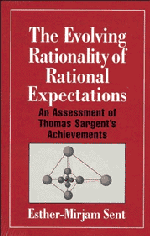3 - Accommodating Prediction
Published online by Cambridge University Press: 18 December 2009
Summary
They will get it straight one day at the Sorbonne.
We shall return at twilight from the lecture
Pleased that the irrational is rational
Wallace Stevens, It Must Give PleasureThe concept of rational expectations starts from the idea that individuals should not make systematic mistakes. Agents are not stupid; they learn from their mistakes and draw intelligent inferences about the future from what is happening around them. Although econometricians were the first promoters of rational expectations, their initial focus on methods for restricting the parameters of lag distribution subsequently changed to restricting vector autoregressions. Whereas the previous chapter indicated how Sargent tried to use rational expectations to restrict distributed lags, in this chapter we witness how Sargent, influenced by a change in his econometric environment, tried to use rational expectations to restrict vector autoregressions. The times are the late 1970s to early 1980s, the places are the University of Minnesota at Minneapolis and the University of Chicago, and the supporting roles are performed by Neil Wallace, Christopher Sims, and Lars Hansen. Before continuing Sargent's saga, section 3.1 gives some background information on controversies over the possibility of prediction in economics. Section 3.2 analyzes Sargent's attempts to predict by adopting vector autoregressions “without too much a priori theory.” Section 3.3 addresses the resistances Sargent encountered as he tried to put this idea to use. Section 3.4 discusses his efforts to combine vector autoregressions with general equilibrium theory. Section 3.5, as you might expect, discusses the resistances Sargent subsequently encountered.
- Type
- Chapter
- Information
- The Evolving Rationality of Rational ExpectationsAn Assessment of Thomas Sargent's Achievements, pp. 48 - 98Publisher: Cambridge University PressPrint publication year: 1998



